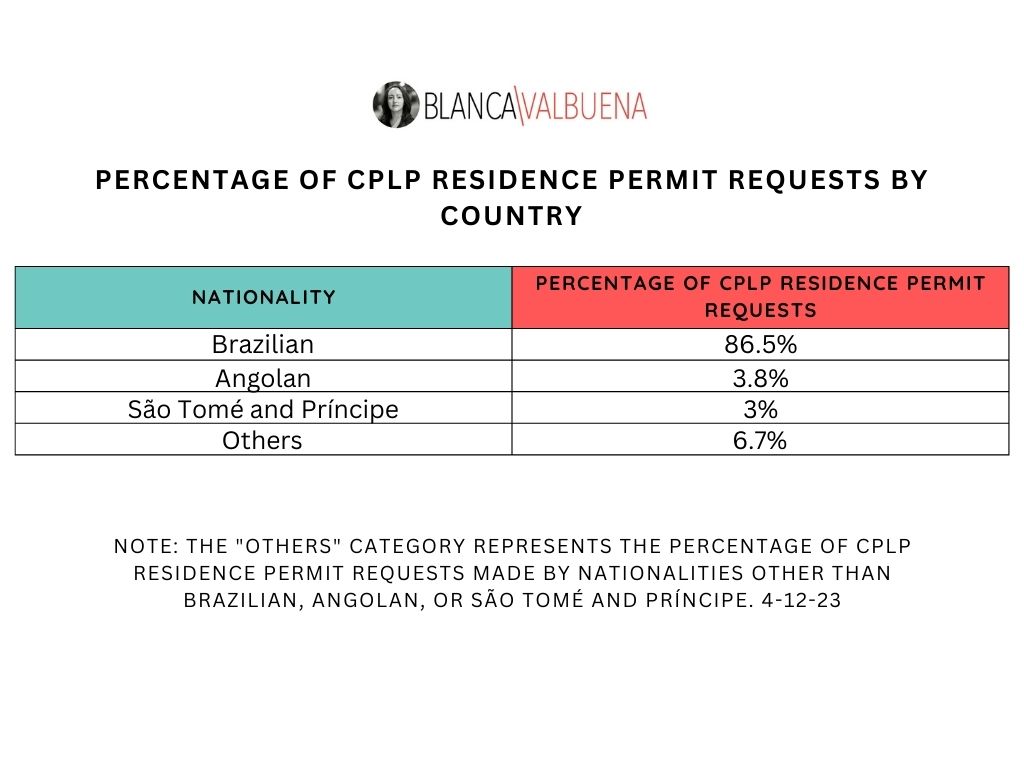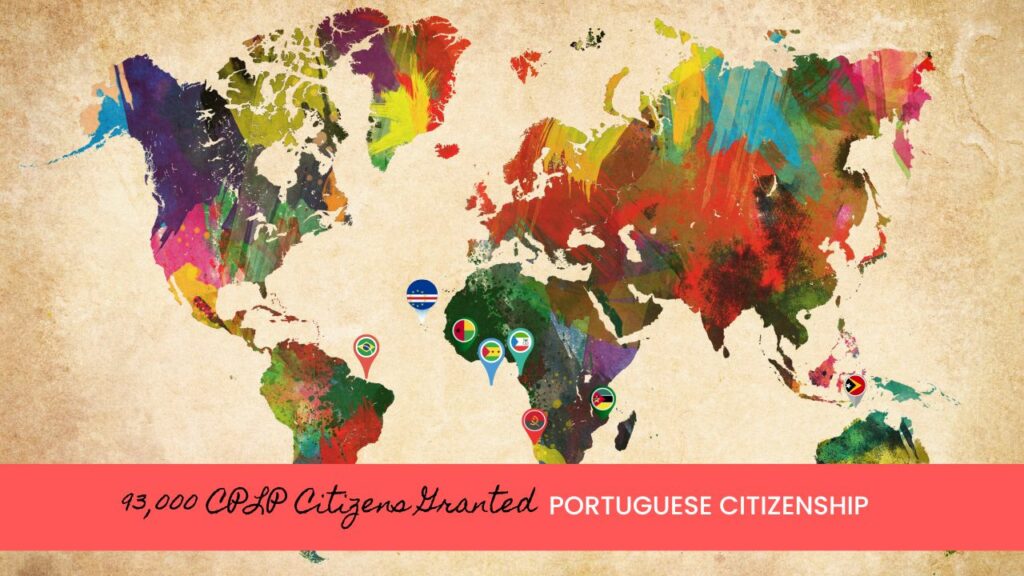Portugal recently launched a portal designed to streamline obtaining residence permits for Community of Portuguese Language Countries (CPLP) citizens. As a result, over 93,000 CPLP Citizens Granted Portuguese Residence Permits in just one month through this platform.
The portal, provided by the Foreigners and Borders Service (SEF – which will soon be replaced by APMMA), aims to simplify the process for CPLP citizens, making it easier for them to live, work, and contribute to society in Portugal.
What is a CPLP Country & What Are Its Member States
The CPLP includes nine member states:
- Portugal
- Angola
- Brazil
- Cape Verde
- Guinea-Bissau
- Equatorial Guinea
- Mozambique
- São Tomé and Príncipe
- East Timor.
The CPLP, a friendly get-together of countries united by the Portuguese language and a shared history as former Portuguese colonies, has evolved into more than a cultural bonding experience. These nations are now joining forces in trade and politics, proving that they’re more than just pretty faces speaking a beautiful language and overcoming their complex past. With the mighty power of being the world’s fourth-largest oil producer and boasting 270 million citizens, the CPLP is making waves in the global scene.
In 2017, the nine-member states decided to take their relationship to the next level, agreeing to work together on the seas, tourism, economy, and even some top-notch defense and cooperation mechanisms. They’ve also extended a welcoming hand to observer states, with Argentina eagerly waiting to join the party. So, here’s to the CPLP, where the shared love for the Portuguese language and its colonial history is just the beginning of a fruitful collaboration!
The residence permit is granted under the mobility agreement between these nations, aiming to promote cooperation and ease of movement for their citizens.
The CPLP Residence Permit Platform: Key Features
The new CPLP residence permit platform went live on March 13 and caters to Lusophone immigrants with pending cases at the SEF until December 31, 2022, and those with a CPLP visa issued by Portuguese consulates after October 31, 2022.
Since its launch, the platform has received 114,131 requests for residence permit certificates from CPLP citizens. Of these requests, over 103,572 documents with payment references were issued, resulting in 93,000 CPLP Citizens Granted Portuguese Residence Permits.
Brazilian Nationals: The Majority of CPLP Residence Permit Holders

Brazilian nationals make up the majority of CPLP residence permit requests, representing 86.5% of the total. Can you blame them? After Bolsonaro, I would do the same.
They are followed by citizens of Angola (3.8%) and São Tomé and Príncipe (3%).
The application process involves consulting various databases to ensure that applicants are not subject to any indication for return or refusal of entry and stay.
Of the total number of applications, 6,043 alerts were detected, which required further consultation to determine whether a residence permit could be granted.
Benefits of the CPLP Residence Permit
The new digital-only model provides CPLP citizens access to essential services such as education, health, social security, professional activity, professional training, and justice. This allows immigrants to regularize their situation and contribute to Portugal’s society and economy.
The residence permit for CPLP immigrants costs 15 euros and can be obtained within 72 hours of submitting the application. It is initially valid for one year and can be renewed for two further periods of two years.
Increasing Foreign Population in Portugal
Data from SEF shows that the foreign population legally residing in Portugal increased for the seventh consecutive year in 2022, totaling 757,252. The Brazilian community experienced the most significant growth, making it the most numerous foreign community in Portugal, with 233,138 residents by the end of last year.
A Successful Initiative for CPLP Citizens
The new CPLP residence permit platform has successfully granted over 93,000 residence permits to Lusophone immigrants in just one month. This streamlined process allows for easier integration and access to essential services, benefiting the immigrants and Portugal.
Comparing Residence Options in Portugal
Portugal has recently granted over 93,000 residence permits to CPLP citizens through a new, streamlined portal. However, two other residence options, the Golden Visa Program and the Sephardic Jews Citizenship Scheme, have experienced suspensions and proposed end dates. I came in on a D7 visa, and while I think the incentive to get people from CPLP countries into Portugal as a way to pay reparations to countries whose people lost so much due to Portuguese extortion, I can’t help but feel a bit miffed. “Expats” get a lot of blame for the issues here in Portugal…and we are merely the canary in the mine.
Today, I will attempt to analyze why CPLP citizens are receiving preferential treatment in comparison to “expats” and Sephardic Jews.
The Golden Visa Program: Suspension and its Effects
Portugal’s Golden Visa Program, which allowed non-EU citizens to obtain a five-year residency by making specific investments, is no longer in place. The suspension of the Portuguese Golden Visa program has resulted in disruptions in planned investments, particularly in the culture sector, impacting film projects and the real estate market. The end of the Golden Visa Program is likely to have various negative impacts, including decreased foreign investment, a slowdown in the real estate market, and decreased job creation. Was the program perfect? No. Did it help Portugal? IMHO that is a hard YES. When I started coming to Lisbon, it seemed that every 3rd building was in shambles. Foreign investment has made the city much nicer (I can only speak about Lisbon where I live). This is a different city from when I started visiting in 2014.
The Sephardic Jews Citizenship Scheme: Government Plans to End
The Portuguese government has announced plans to end the law granting citizenship to descendants of Sephardic Jews. The reason behind this was a sort of reparation to descendants of Portuguese Sephardic Jews who were expelled from Portugal and Spain in the 15th Century.
This decision follows a series of changes made in the past year to tighten the rules for obtaining citizenship through this scheme, with applicants now required to provide additional documentation proving a connection with Portugal.
The closure of the Sephardic Jews Citizenship Scheme has raised concerns about specific organizations’ profits and high-profile individuals’ involvement.
Just like the Golden Visa, the Sephardic Jew Citizenship Scheme was definitely not perfect, but I think of the friends I have who got their citizenship this way and I think of where they would be now without this.
Preferential Treatment for CPLP Citizens: Why the Difference?
The preferential treatment for CPLP citizens can be attributed to various factors:
1. Cultural and Linguistic Ties: Portugal shares a common language and cultural heritage with CPLP countries. This connection fosters a sense of solidarity and cooperation, making it easier for citizens from these countries to integrate into Portuguese society.
I can’t argue with the language part, but people from CPLP countries don’t necessarily integrate into Portuguese society. I don’t see many Portuguese-Speaking African people hanging out with Lisboetas. Brazilians are tolerated, but looked down upon. So, while people from CPLP countries will have an easier time communicating, I’m not sure about the integration part.
2. Economic and Political Goals: The residence permit for CPLP citizens is granted under the mobility agreement between the organization’s member states. This agreement aims to promote cooperation and ease of movement for their citizens, ultimately benefiting all member countries’ economies and political relationships.
I can definitely see this. CPLP people will have many more opportunities in Portugal. This citizenship scheme will also help Portugal with its aging population and brain drain (although it will just replace the young people who left with new young people – it does not address the reason for the brain drain).
3. Social Integration: The streamlined process for CPLP citizens allows for easier access to essential services, such as education, health, and social security. This benefits the immigrants and helps their integration into Portuguese society, making them more likely to contribute meaningfully to the country.
You saw what I wrote above. Just because someone speaks the language, it does not mean they integrate.
4. Addressing Controversies: The suspension of the Golden Visa Program and the proposed end of the Sephardic Jews Citizenship Scheme can be seen as an attempt to address controversies surrounding these programs, such as concerns about money laundering, and to focus on promoting social integration and cultural exchange with CPLP countries.
I think for Portugal, this and the growing disdain for “Expats” are the main reasons for putting this program together.
Balancing Residence Options in Portugal
The preferential treatment for CPLP citizens highlights Portugal’s commitment to promoting cultural exchange and cooperation with its Lusophone counterparts.
I am not against this. Heck, I feel like the US should be doing something similar for Mexicans whose descendants lost their land and for descendants of African slaves on whose back the US was built. I am all for this program…however…
The suspension of the Golden Visa Program and the proposed end of the Sephardic Jews Citizenship Scheme will have negative impacts; and I think the government should work on fixing the reasons we have issues in the first place. What issues? Here are a few:
- Few lucrative job opportunities in Portugal
- Incredibly high taxes
- Tourism centered around Lisbon, Porto, and the Algarve.
- More housing programs are needed for young first time home buyers.
- And…as for real estate, the government needs to figure out how to catch up the low rents people with super long contracts pay so that landlords can properly take care of their homes. Maybe split the increase with the tenants so they aren’t in for a huge shock. They also need to cap the rise of real estate prices some, it is getting ridiculous.
Sources
FAQs
CPLP stands for Community of Portuguese Language Countries or Lusophone Commonwealth.
Over 93,000 CPLP citizens were granted Portuguese residence permits through a new, streamlined portal.
Preferential treatment for CPLP citizens can be attributed to cultural and linguistic ties, economic and political goals, social integration, and addressing controversies surrounding other residence options.
Portugal’s Golden Visa Program has been suspended, causing disruptions in planned investments, particularly in the culture sector and real estate market.
The Portuguese government has announced plans to end the Sephardic Jews Citizenship Scheme, although the exact changes and end date have not yet been specified.
There are nine member states in the CPLP.
The streamlined process for CPLP citizens allows for easier access to essential services such as education, health, social security, professional activity, professional training, and justice.
Yes, most CPLP countries share a history as former Portuguese colonies, reflecting a complex and sometimes sordid past.
The new CPLP residence permit platform is a digital-only model that simplifies the process for CPLP citizens to obtain residence permits in Portugal, allowing them to regularize their situation and contribute to Portugal’s society and economy.

